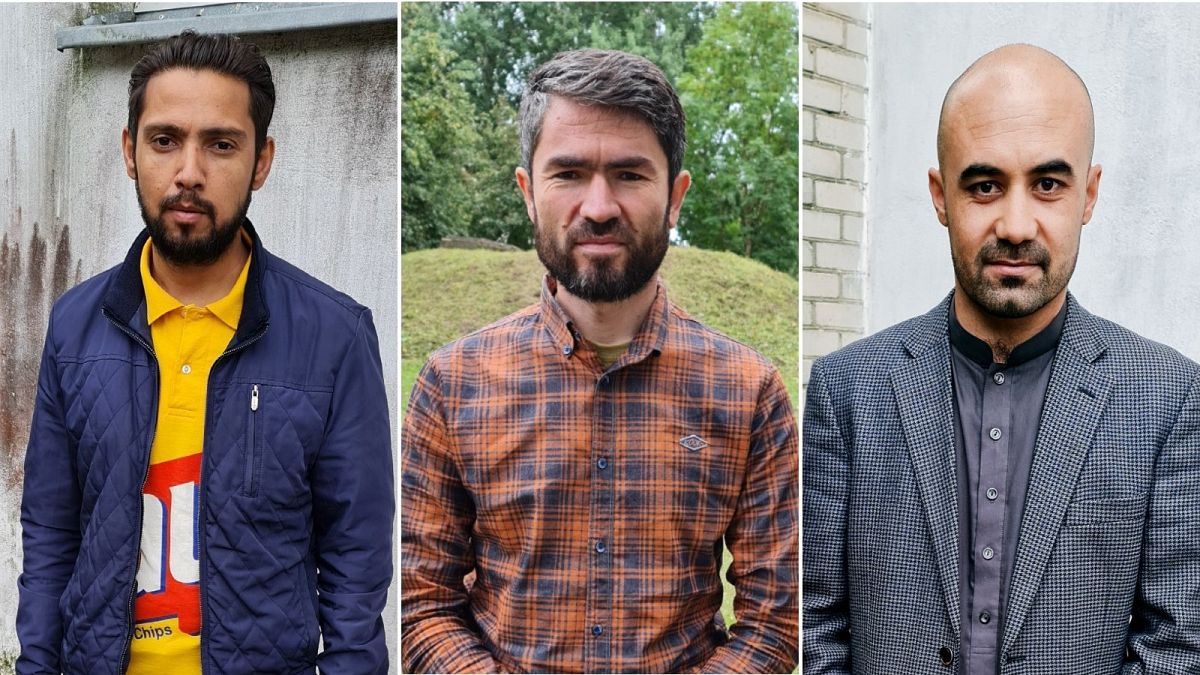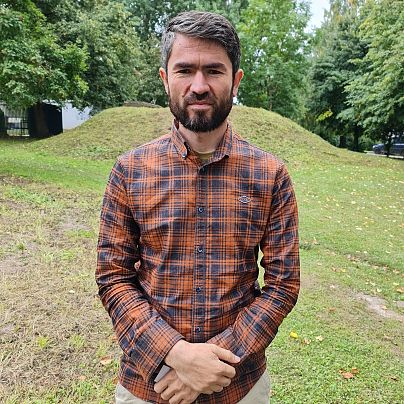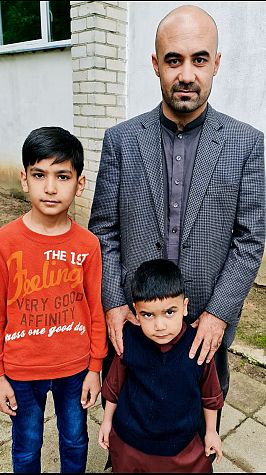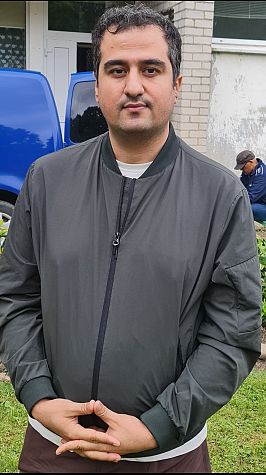Fearful for their families back home but hopeful for a new start, these are the Afghan escapees who now count Europe as their home.
Arriving with tales of fear, shock and dramatic escapes, thousands of Afghan refugees have been airlifted to Europe in recent days.
While some are just passing through on the way to the US or another destination, many of the 181 that landed in Lithuania hope to build a new life in the country.
Many of them served as interpreters for the 5,000 Lithuanian troops that served in Afghanistan over the last two decades.
Ghulamuddin: 'I came here in just my sandals'
Ghulamuddin Sadiqi, a former interpreter for Lithuanian troops in Afghanistan, says he arrived in Lithuania in sandals.
“Many of us came here with very little and, therefore, we expect help from [the] Lithuanian government," he said.
"I came here with only one pair of shoes – the sandals you see me wearing now.”
Ghulamuddin, who had previously only ever travelled to India and Pakistan, brought his wife and five children, aged 3, 5,7, 10 and 17.
All seven of them are sleeping in a single room that was until now used by students of a vocational school.
“We had just a few minutes to leave our house in Afghanistan," he said.
"It was 10 pm when I received a phone call from the Special Lithuanian Armed Forces deployed in Kabul airport and was asked to come as soon as possible.
"With the Taliban advancing onto the capital, we had to hide. We’re happy to be in safety now. We really cannot complain of anything here,” he said.
Mustafa: 'I just hope they will not suffer'
"My whole world has fallen apart after the Taliban captured the country and Kabul," Mustafa Babakarhail, a former interpreter for the Lithuanian army, told Euronews. "We knew it was advancing, but perhaps few anticipated such a rapid collapse.“
Mustafa brought his wife and two children to Lithuanian but is fearful for other family members and relatives he left behind. “I just do now know what will happen to them," he said. "I can just hope that they will not suffer.”
The 31-year-old said his life could have been in "grave danger" had he stayed in Afghanistan, due to his five-year stint interpreting for the NATO-led coalition. Besides English, he can also speak Pashto and some Urdu.
Asked to share his impression about the first days in Raseiniai, Mustafa started to speak excitingly about the weather.
“I knew that it gets cold in Lithuania," said Mustafa "But now we have the last days of August and it is pretty cold already. I’ve been told how cold it gets in winter. Unfortunately, many of us came here very lightly dressed. I am especially concerned about our children, but, like many fellow Afghans, I am relying on [the] help of Lithuania, the United Nations and the European Union.” Mustafa Babakarhail said.
Mustafa, addressing Lithuania's existing migrant influx, argued Afghans airlifted by Lithuania are different to those arriving via Belarus.
“Our case is completely different," he said. "Unlike the others, we did not come here illegally. If there hadn't been a threat to our lives, we’d have stayed in our own country. Your government invited us acknowledging what we did for the Lithuanian troops.”
He added that Afghanistan had made big progress over the last 20 years under the NATO-led coalition but admitted his surprise at the unexpected collapse of the Afghan government.
Said: 'I am shocked there was so little resistance'
Said Omar Saidi, another former interpreter for Lithuanian troops in Afghanistan, came to Lithuania with his four children, aged 6,9, 12 and 15.
But, like Mustafa, he is very worried for those he left behind.
“My father worked for seven years as a local commander of guards for the Lithuanian troops. One of my brothers left in Afghanistan has also worked as a guard for the coalition troops. I am very worried about them, as the Taliban is now searching for those who worked for the coalition troops."
Said told Euronews the only option for his family left behind was to hide.
Asked why they couldn't be evacuated with him, he added: “Well, the entire evacuation happened very fast and the priority was to evacuate interpreters and their wives and children first.”
He said he still speaks with his father and brother via WhatsApp but fears the internet connection will go down with the Taliban in power.
“Like many Afghans, I am shocked by their ability to take over the entire country so soon and without any resistance,” he said.
Said expressed his gratitude to the Lithuanian government and that he had already submitted his asylum application.
"Due to the coronavirus pandemic we are under quarantine for two weeks, I cannot complain about the conditions, but, certainly, it would be nice to have some certainty afterwards,” he said. “My profession is as a psychologist, so it will be hard to get a job in the field here."
Haji: 'I heard what sounded like gunfire as the plane took off'
The story of Haji Akbar Sultani is quite different from that of his fellow Afghans on the evacuation flight to Lithuania.
As a PhD student of Vilnius Gediminas Technical University (VGTU), he had gone home on holiday in late July to Mazar-i-Sharif, his hometown in northern Afghanistan.
But with Taliban forces quickly approaching, he was forced to flee the town.
“In fact, the Talibs were quicker – my wife and I had to run away from the town with Talibs in it already. I rented a car to drive all the way to Kabul airport.
"We were stopped by the Talibs several times on the way. Every time I’d tell them that my wife is very sick, that she cannot receive proper treatment in Mazar-i-Sharif and we need to get to Kabul to see doctors."
He said he was “very lucky”: had the Talibs checked his bag in the car boot, they would have found his passport with a European Union visa.
“That would have been the end,” he said, convinced.
But, believing his concocted story, the Talib fighters let them pass without a thorough check.
He says is “very much” grateful to VGTU chiefs, who got in touch with the Lithuanian troops in Kabul airport asking them to get their student out of the country.
In his words, the departure from Kabul airport was very “very rough”
“The plane took off abruptly and steeply. With the plane still on the runway, I heard what sounded like a machine gun. It was very scary,” he recalled.




